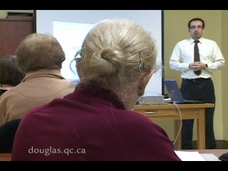News
Slowing the Onset of Alzheimer's Symptoms : A Therapy Developed at the Douglas Provides Hope
2010-02-25
Researchers at the Douglas Mental Health University Institute are launching a research project to assess the effectiveness of cognitive remediation in slowing the onset of Alzheimer’s disease for people with mild cognitive impairment. Developed by teams at the Douglas, the cognitive remediation program launched in January 2009 has produced what seem to be promising results. A research project involving neuropsychological, memory and attention tests will therefore begin in February 2010 to quantify participants’ cognitive progress.
The Douglas cognitive remediation program (meaning to correct or alleviate a cognitive loss) includes three components: relaxation, mnemotechnic strategies, and computer stimulation. The goal is to improve the skills required to perform daily activities.
“This research project will allow us to measure the effectiveness of cognitive remediation; if the results are positive, we can add this therapy to our range of tools to treat people with predementia syndrome,” explained David Fontaine, neuropsychologist and project co-investigator.
Also co-investigator on this project, Natasha Rajah, PhD, designed the study parameters with a psychosocial control group to help distinguish benefits linked to psychosocial aspects (e.g. being in a group, socializing) from benefits linked strictly to cognitive therapy. Natasha Rajah is a cognitive neuroscientist with a specialization in aging and dementia.
The research project will last two years. Participants are available to talk about their experiences so far.
Principle investigators: Natasha Rajah, PhD, David Fontaine and Céline Brunelle
Associate researchers: Vasavan Nair, MD, Dolly Dastoor, PhD, Johanne Dubé, Luc Valiquette.



